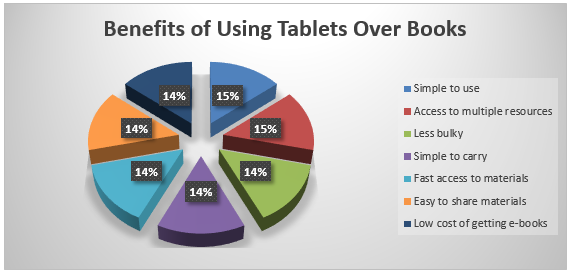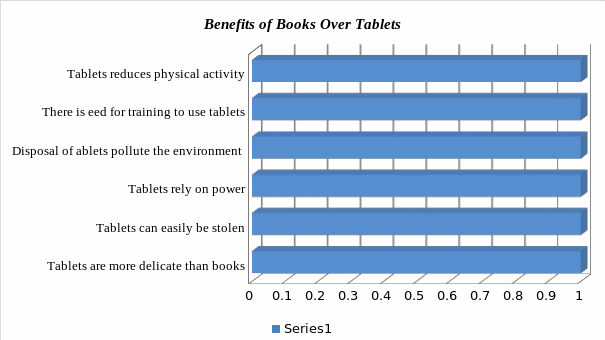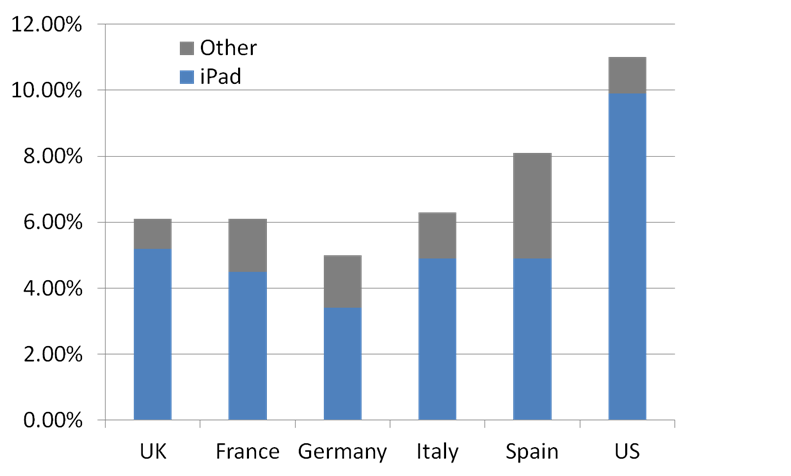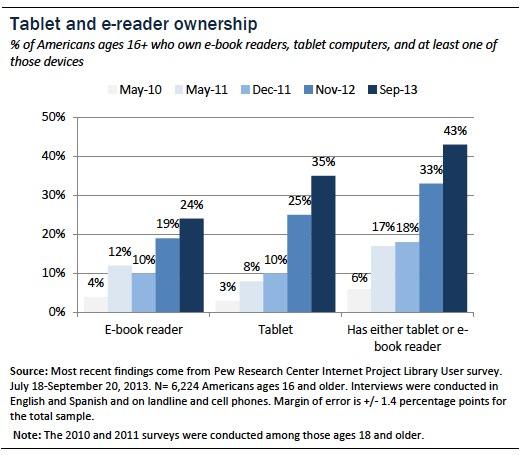Introduction
The world is increasingly embracing technology and institutions of learning are some of the most affected by this emerging trend. Within the past two decades, scientists have tried coming up with ways of making learning simple and interesting both to the learner and the educators. Coming up with assistive technologies has been one of the main focus of these scientists as they try to ensure that teachers and students can interact easily and that materials can be accessed easily (Zakrzewski, 2016).
The emergence of tablets is one of the recent inventions in the field of education and it is clear that it is soon replacing textbooks. However, many stakeholders are not sure if indeed tablets should replace the textbooks. It is a debate that has been raging over the recent past and it would be appropriate to conduct a study over this issue.
Purpose
The debate over whether tablets should replace textbooks has been going on for some time now as the stakeholders in the education sector try to embrace the emerging technologies. This subject matters a lot because it is important to determine if indeed tablets can effectively replace textbooks before this technology can be fully embraced in learning institutions (Warren, 2014). This project is worth doing because it will critically evaluate the existing literatures and conduct some further research to determine the relevance of tablets in the learning institutions.
It will be an informative report that will help the policy makers understand what is at stake on this issue. It will explain to them why indeed it is important to have tablets instead of textbooks or vice versa in learning institutions. The project will weigh the pros and cons of using textbooks and tablets and then propose the one that is most appropriate.
Thesis
In this project, the researchers seek to investigate the relevance of tablets in the modern learning institutions, and whether or not they can replace textbooks. The study will investigate the benefits of using tablets by both the learners and educators and compare these benefits closely with the benefits that the books have. The researchers will then investigate the shortcomings of both books and tablets. This will give a balanced view about which of the two options is more appropriate for learners. The following are the specific research questions that will help in this investigation.
- What are the benefits of using tablets in learning institutions?
- What are the challenges of using tablets in learning institutions?
- What are the benefits of using textbooks in learning institutions?
- What are the challenges of using textbooks in learning institutions?
- Which of the two options, textbooks and tablets, is more appropriate in learning institutions?
Literature Review
Background
Scholars have conducted wide research on the use of emerging technologies in institutions of learning. According to Gabrielle, Cayton, and Xingyu (2015), the use of tablets is one of the most recent technologies that have emerged in the learning institutions. A report by Warren (2014) indicates that tablets have received massive acceptance among the students and teachers and it is replacing textbooks at unprecedented rates.
Some stakeholders in the education sector are strongly convinced that this new technology has come up at the right time and that it will be a perfect replacement for the textbooks. They believe that textbooks are becoming outdated and that the use of tablets will define the future of accessing learning materials, especially at higher learning institutions. However, this view is not supported by all the relevant stakeholders.
According to Zakrzewski (2016), it is important to take a number of factors into consideration before rushing on the use of tablets instead of books. This scholar argues that replacing textbooks with the tablets takes away the meaning of research among the young scholars who are expected to look for materials from the physical libraries. Born (2013) says that the act of looking for the relevant materials in the libraries is a life-lesson in itself and it makes the learners become more responsible members of the society.
They get to learn that life is about struggle and that to get what we need in life, we need to work hard. This is not the case in situations where the materials can be accessed by simply keying in the topic and all the materials are made accessible. Schein (2013) says that such technology promotes laziness and it increases cases of cheating when students are given particular assignments.
Critique
A critical analysis of the existing literatures shows that the shift from the use of textbooks to the use of tablets is almost unavoidable. The society today has embraced technology and it is important that all the stakeholders appreciate this fact. Born (2013) says that it is true that using textbooks made it difficult for learners to access materials and this, in a way, made them more responsible and very hardworking.
However, it is important to appreciate that the world is shifting towards technology-supported systems. Tablets have come at a time when readership among learners of different stages was going down at an alarming rates. The modern-day scholars consider textbooks to be bulky materials that they cannot walk around with, especially when they have to conduct some research while at home. Tablets offer a very good alternative and they promise to revive readership among the learners of different ages.
Zakrzewski (2016) strongly criticizes Loewen (2008) for arguing that textbooks encourage hard work and a sense of responsibility among the scholars. Warren (2014) also says that it is not right to argue that tablets make learners lazy. It may make the work of researchers simpler, but it does not take away the need to read these materials critically and come up with answers to every research question that a scholar is undertaking. It is, therefore, misleading to claim that tablets will create a breed of learners who do not value the need to conduct research (Oz, 2014). Learners still have to work hard to come up with the right solutions to their research problems. The only change that is witnessed under this situation is that the materials are made easily accessible to the learners.
Solutions
It is important to find a solution to this raging debate on whether tablets should replace textbooks in the learning institutions. According to Maninger and Holden (2009), the stakeholders in the education sector should be open-minded when engaging in debates. Change is a force that no one can resist, and it is apparent that the use of tablets is a new technology that indeed promises a greater academic future than the use of books.
It was a wonderful invention in the education sector when books were invented to replace stone tablets. Now a time has come when it is apparent that a new invention is poised to replace the use of textbooks. Warren (2014) says that it would be appropriate for the stakeholders to come up with effective ways through which tablets can be used in schools. It is no longer a question of whether or not tablets should be used in learning institutions.
The main issue of focus should be how they should be used to ensure that learners get the best out of them (Orden, 2006). It is time for the stakeholders to define the age at which learners can be exposed to tablets and how they can be supplemented by textbooks at different learning stages.
Methodology
Explanations
The purpose of this study is to compare the effectiveness of textbooks and tablets for learners and educators and determine if indeed tablets can be used instead of textbooks in learning institutions. The researchers had to collect both primary and secondary sources of data. Secondary sources of data were obtained by reviewing the existing literatures on this topic. The researchers conducted a review of literatures to help develop a basis for this study.
Through this review, it was possible to understand what other scholars found out and the knowledge gap that exists in their reports. Secondary sources included books and journal articles that focused on this topic. After determining the research gaps, it was necessary to conduct primary data collection to try and address the gaps in the existing bodies of knowledge. The researchers had to interview some of the stakeholders in the education sector to determine their views over this topic. It was necessary to conduct primary data collection because this is a relatively new area of research and some stakeholders have complained that the policy makers have failed to take their views into consideration.
Research instruments
To collect primary data, the researcher had to find the relevant tools. Given that the researchers wanted to conduct a survey, questionnaire was considered the best tool of collecting data from the respondents. The questionnaire had three sections. The first section of the questionnaire focused on the demographical factors of the respondents. The second part focused on the level of education of the respondents. The last section focused on the specific questions about the use of tablets and books. The research took quantitative approach. It was important to ensure validity and reliability of the study. As such, the researchers avoided any form of personal bias when collecting and analyzing data to enhance reliability. The use of mathematical tools enhances validity of the study.
Population
The research population included learners at various levels of education, their educators, parents, administrators, and other stakeholders. The researchers sampled 50 participants for this study. The participants included educators, learners, administrators, parents, and other relevant stakeholders. Stratified sampling technique was used because of the various groups that had to be interviewed. This was an effective way of including all the stakeholders. All participants were fully informed of the intended study.
Findings & Implications
Findings
The study revealed a number of benefits of using tablets that make it very popular among the scholars over books. The following graph identifies some of the benefits that were stated by the participants.

From the above figure, factors such as simplicity of the tablets, ability to access multiple resources, small size and little weight of the tablets, fast access to materials, and ability to share materials were some of the benefits noted.
It was also necessary to determine the factors that made tablets undesirable compared to books. The following figure shows the results obtained from the respondents.

The respondents stated that issues such as insecurity, need for training, environmental pollution, need for power, easy with which tablets can be stolen, and the delicate nature of tablets make them more undesirable compared to books.
Implication
The findings of this study strongly suggest that the future of books in learning institutions is very bleak. It is clear that the respondents feel that books offer greater benefits than tablets. Inasmuch as they appreciate that tablets also have a number of challenges, they are strongly convinced that these challenges can be addressed.
It is important for all the stakeholders to find modalities of embracing the use of tablets in learning institutions, especially among the learners at higher learning institutions. The study has revealed that books are more appropriate for the junior learners. However, undergraduate and post-graduate students can use tablets to enhance their research.
Conclusion
Summary
In this study, it has been revealed that tablets have become important learning materials. The stakeholders can no longer ignore this tool. Inasmuch as it has a number of weaknesses, it offers more than books. All the stakeholders must find ways of embracing this technology because it is very relevant. The shift should be done systematically to achieve the desired results. It is also important to involve everyone in this process.
Recommendations
The following recommendations should be taken into consideration.
- Tablets should majorly be used by learners at advanced levels of education.
- Tablets should not replace textbooks completely.
- All stakeholders should be involved when an institution is considering to make this change.
- The stakeholders should find ways of addressing the major concerns such as environmental impacts.
References
Born, C. (2013). The technology-ready school administrator: Standards-based performance. New York, NY: Cengage.
Gabrielle, A., Cayton, F., & Xingyu, P. (2015). Tablet-Based Math Assessment: What Can We Learn from Math Apps? Journal of Educational Technology & Society, 18(2), 3–20.
Loewen, J. W. (2008). Lies my teacher told me: Everything your American history textbook got wrong. New York, NY: New Press.
Maninger, R., & Holden, E. (2009). Put the Textbooks Away: Preparation and Support for a Middle School One-To-One Laptop Initiative. American Secondary Education, 38(1), 5–33.
Orden, S. (2006). Using a Tablet PC in the German Classroom to Enliven Teacher Input. Die Unterrichtspraxis / Teaching German, 39(1/2), 109–111.
Oz, E. (2014). Management information systems. Melbourne, Australia : Course Technology.
Schein, E. H. (2013). Humble inquiry: The gentle art of asking instead of telling. Hoboken, NJ: Wiley.
Warren, E. (2014). A fighting chance. New York, NY: Metropolitan Books/Henry Holt and Company.
Zakrzewski, J. (2016). Using iPads to Your Advantage. Mathematics Teaching in the Middle School, 21(8), 480–483.
Appendices
Appendix 1: Popularity of tablets in Europe and United States

Appendix 2: Tablet and e-reader ownership

Reflection Essay
This research project offered me a great opportunity to learn about the emerging technologies in the field of education and how they affect the learning process. I have used textbooks for the better part of my academic life and I personally find it fascinating to use tablets. Although sometimes I feel that when it comes to conducting serious academic research textbooks are still more important, I believe that the future is all about the use of tablets. I learned that it may take a while for all the stakeholders to embrace this new technology hence it may be necessary to exercise tolerance as we shift to a new form of accessing academic materials.
In this research project, I was specifically assigned the task of looking at the benefits of using tablets. I also did some research to compare the efficiency of using both textbooks and tablets. I enjoyed working as a group. I realized that the best way of achieving success when working as a group is to embrace division of labor. This involves specifying what every member of the team should do and how their individual works will be combined into a complete single project.
While working as a group, I also learned that tolerance is of great significance to learners. Sometimes individual members may have varying opinions over an issue or how a given task should be conducted. It was clear that being open-minded, flexible, and reasonable are great characteristics of achieving success as a team.
When conducting this research, we met a number of obstacles worth mentioning. First, it was challenging to assign every group member specific tasks to investigate. It was also not easy to determine how the individual work of every member could be condensed into a single research document. Finding the materials needed did not pose serious challenges. We were able to overcome all these challenges.